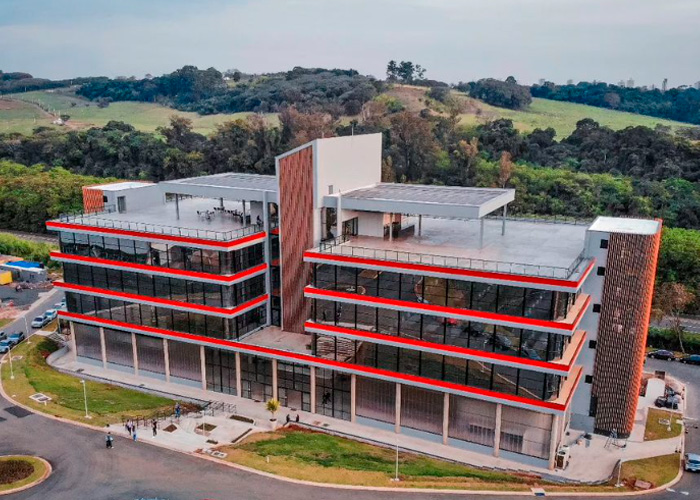Education
5 minutes of reading
Distance Education gains credibility and transforms the educational landscape
In the last decade, we have witnessed a revolution in the field of education in Brazil: the explosive growth of Distance Education (EAD) courses.
Published in
Mar 07, 2025
In the last decade, we have witnessed a revolution in the field of education in Brazil: the explosive growth of Distance Learning (EAD) courses.
Driven by the evolution of technology and changes in social dynamics, these courses have become an increasingly popular and accessible alternative for those who want to advance their careers or take new professional paths.
This is a growing phenomenon that has been transforming the educational scenario and is justified by some factors such as:
- Ease and practicality: learning adapted to the student’s pace and availability.
- Lower costs: quality education within reach of more people.
- Breaking down geographical barriers: access to large educational centers without students having to leave the city where they live.
- Continuous development: greater demand for specialization and postgraduate courses.
Tradition and security
Other very important elements were added to this successful mix:
- Renowned universities, both public and private, have seen this teaching model as a possibility to expand their activities and contribute to professional development throughout the country.
- Teachers with great credibility and visibility also contribute to the image of programs and curricula, in addition to improving the quality of teaching.
This ended up bringing another status to the modality: distance learning, especially when associated with large institutions, gained a prominent place in resumes and a new, more attentive look from recruiters.
There are several companies, in fact, that have invested heavily in the training and development of their employees through distance learning courses.
Read more: What is the social role of companies in training qualified labor?
The data confirms

The Skills Outlook Employee View survey, a survey conducted by LinkedIn with more than 10,000 employees worldwide, brought, in April 2023, data indicating that 40% of Brazilians prefer to qualify themselves professionally with distance courses offered by educational institutions, compared to 34% who prefer traditional, in-person models.
We also have information that 22% find websites and apps to be their ideal way of learning.
It is important to note that when we talk specifically about postgraduate courses, the number of people who prefer distance learning increases from 40 to 80%.
This shows that a pedagogical transformation is taking place, since a large number of people do not feel encouraged to take part in the traditional classroom learning method.
Pecege at the forefront of this trajectory
It is interesting to note how this transformation has developed differently in different cases.
At Pecege, for example, distance learning is part of the institution’s origins. This modality has been improved and gained impressive technological and logistical proportions in the last 10 years.
Before the expansion of access to high-speed internet, Pecege already had distance classes transmitted via satellite and, in 2013, it successfully migrated to digital transmission and continues to invest in technology and pedagogical adaptation to ensure quality and efficiency in the transmission of knowledge.
When the Covid-19 pandemic forced institutions to quickly adapt to a new way of maintaining their noble work of educational training, Pecege already had both the know-how for the task and also had it as its main activity. This fact justifies its exponential growth in 2020 and 2021.
At Pecege, distance learning does not depend solely on technology

Despite the questions about the differences between in-person and virtual learning, distance learning involves serious didactic and operational issues for the development of courses.
Teams dedicated to student relations, lesson planning, and pedagogical monitoring and guidance are made up of numerous specialized members dedicated to maintaining the development of this project that Pecege began in 2003.
Mentioning these sectors may seem obvious, but given the large number of students and the specific conditions of distance learning, investing in the sectorization and specialization of these professionals is essential.
The experience needs to be pleasant and effective. Students need to feel that this is a new dynamic, but that the goals of learning and the dedication it requires are present in this process.
It seems like yesterday
If we think about the most traditional distance learning courses that a little less than two decades ago were the only references in distance professional training, sending their materials by mail, we get the impression that little time has passed.
But when we analyze how much all this has changed in this short period, we can see that these are two very different moments. And this is due to several factors.
We are on a path of no return in this area. Even the most traditional courses that fill so many memories now have a digital platform.
Visit the Pecege website and learn a little about the structure and the various solutions and projects dedicated to the task of taking quality knowledge ever further.
What's Happening at Pecege
Check out the latest news and learn more about our events.
Subscribe to our Newsletter
Receive monthly content from Pecege.
By subscribing, you agree to our
Terms and Privacy Policies